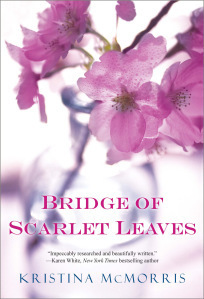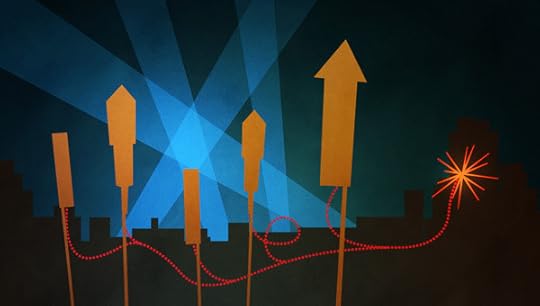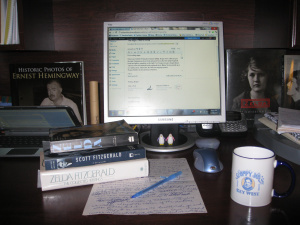Erika Robuck's Blog, page 24
March 7, 2012
Review: The Baker’s Daughter
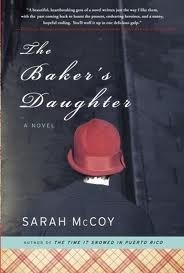
“She paused momentarily at the girl’s room, hand on the knob, and leaned an ear to the door. A light snore trembled through the wood, and she matched her breath to it. If only she could halt the seasons, forget the past and present, turn the handle and climb in beside her like old times. But she could not forget. Her secret pulled her away…”
Sarah McCoy, The Baker’s Daughter
The Baker’s Daughter, by Sarah McCoy, was released in January of this year and is 304 pages. I met Sarah in October at a writer’s retreat hosted by Kristina McMorris, and bought the book while at a signing at One More Page Books in Arlington, VA. Sarah is one of the sweetest, kindest writers I know, so I was thrilled that I loved her novel. (And just in case you think my review is biased, I also bought the book for my sister-in-law and mother-in-law, who each read it in two days, and can’t stop raving about it.)
Set in present day El Paso, Texas and Nazi Germany, The Baker’s Daughter is the story of two women with unresolved pasts full of shame and secrets. The day that Reba, a newspaper reporter with a fiancee to whom she cannot commit, walks into Elsie Meriwether’s German Bakery, both women and their loved ones begin an unexpected journey through past memories that leads to present day redemption.
Reba has been running away her entire life, trying to escape the sins of her father–a troubled Vietnam war vet. When her running takes her an entire coast away from all that she loves, she is forced to evaluate what she wants out of life and what prevents her from claiming it. Her fiancee, Riki, faces his own demons as a conflicted border patrol agent, and a tragedy forces him to reevaluate everything he thinks he stands for.
While Reba interviews elderly baker, Elsie Meriwether, and her daughter Jane, Elsie is unable to hide from painful memories from her past in Garmisch, Germany, where she lived when the Nazis were in power during the second World War. As a young girl, Elsie had initially supported Germany, but as the war progressed and Elsie began to understand the atrocities committed by the Nazis, a young Jewish boy arrived at her door giving her an opportunity for redemption.
I could hardly put down The Baker’s Daughter. The vivid prose, fascinating characters, and suspenseful plot kept me turning pages long past my bed time. The present and the past are interwoven seamlessly, and I found myself reading as fast as I could to find out what happened in each time, though I loved reading both time periods equally.
The Baker’s Daughter gave me a chilling glimpse into the world of the Nazis that I’d never before seen. I had no idea about the Lebensborn Program, where Nazis provided top notch health care and education to women and children of Nazi soldiers who fit their criteria for race, and which was, according to some sources, an Aryan breeding program. It never ceases to amaze me that no matter how much I think I know about WWII, there is always a new and unexplored angle.
The Baker’s Daughter would make a perfect book club pick. The layered plot lines, unique settings, controversial topics, and authentic characters would make for stimulating discussion, and the recipes at the back of the book would provide readers with a tasty way to connect to the characters and the subject matter.
If you love well written, thought-provoking historical fiction, you simply must read The Baker’s Daughter. If you do, I’d love to hear what you think.








Review: The Baker's Daughter

"She paused momentarily at the girl's room, hand on the knob, and leaned an ear to the door. A light snore trembled through the wood, and she matched her breath to it. If only she could halt the seasons, forget the past and present, turn the handle and climb in beside her like old times. But she could not forget. Her secret pulled her away…"
Sarah McCoy, The Baker's Daughter
The Baker's Daughter, by Sarah McCoy, was released in January of this year and is 304 pages. I met Sarah in October at a writer's retreat hosted by Kristina McMorris, and bought the book while at a signing at One More Page Books in Arlington, VA. Sarah is one of the sweetest, kindest writers I know, so I was thrilled that I loved her novel. (And just in case you think my review is biased, I also bought the book for my sister-in-law and mother-in-law, who each read it in two days, and can't stop raving about it.)
Set in present day El Paso, Texas and Nazi Germany, The Baker's Daughter is the story of two women with unresolved pasts full of shame and secrets. The day that Reba, a newspaper reporter with a fiancee to whom she cannot commit, walks into Elsie Meriwether's German Bakery, both women and their loved ones begin an unexpected journey through past memories that leads to present day redemption.
Reba has been running away her entire life, trying to escape the sins of her father–a troubled Vietnam war vet. When her running takes her an entire coast away from all that she loves, she is forced to evaluate what she wants out of life and what prevents her from claiming it. Her fiancee, Riki, faces his own demons as a conflicted border patrol agent, and a tragedy forces him to reevaluate everything he thinks he stands for.
While Reba interviews elderly baker, Elsie Meriwether, and her daughter Jane, Elsie is unable to hide from painful memories from her past in Garmisch, Germany, where she lived when the Nazis were in power during the second World War. As a young girl, Elsie had initially supported Germany, but as the war progressed and Elsie began to understand the atrocities committed by the Nazis, a young Jewish boy arrived at her door giving her an opportunity for redemption.
I could hardly put down The Baker's Daughter. The vivid prose, fascinating characters, and suspenseful plot kept me turning pages long past my bed time. The present and the past are interwoven seamlessly, and I found myself reading as fast as I could to find out what happened in each time, though I loved reading both time periods equally.
The Baker's Daughter gave me a chilling glimpse into the world of the Nazis that I'd never before seen. I had no idea about the Lebensborn Program, where Nazis provided top notch health care and education to women and children of Nazi soldiers who fit their criteria for race, and which was, according to some sources, an Aryan breeding program. It never ceases to amaze me that no matter how much I think I know about WWII, there is always a new and unexplored angle.
The Baker's Daughter would make a perfect book club pick. The layered plot lines, unique settings, controversial topics, and authentic characters would make for stimulating discussion, and the recipes at the back of the book would provide readers with a tasty way to connect to the characters and the subject matter.
If you love well written, thought-provoking historical fiction, you simply must read The Baker's Daughter. If you do, I'd love to hear what you think.








March 5, 2012
Review: Bridge of Scarlet Leaves
"[D]uring Momiji, the season of viewing leaves, the trees in Kyoto blaze red and gold; their youthful green is gone, changed with no choice; the branch yearns to hold on, but a cold wind blows and the last leaf falls; a mere reflection on water remains, a memory of red and gold."
Kristina McMorris, Bridge of Scarlet Leaves
Bridge of Scarlet Leaves, by Kristina McMorris, is 420 pages and was published in February of 2012. I read and loved Kristina's first novel, Letters from Home, and it is one of the novels I gift most to people. Now, I will be able to add Bridge of Scarlet Leaves to my "gifting" list.
In November of 1941, in Los Angeles, California, violinist Maggie Kern is hiding something from her brother, TJ. She is in love with his best friend, Lane, who happens to be Japanese. TJ has always been protective of his little sister, especially since an accident that took their mother's life and their father's mental health, and he wouldn't approve of the relationship.
In order to force their families to accept their love for each other, Maggie and Lane elope, but their days of wedded bliss are numbered when Japan attacks Pearl Harbor. Suddenly, a difficult romance becomes impossible as Japanese families are herded like cattle and sent to interment camps. Maggie faces impossible choices and heartbreak as her family and the world go to war.
Bridge of Scarlet Leaves taught me so much about a terrible place of the American past–the devastation of Japanese-American citizens during the Second World War. Stories from history enlivened through McMorris's characters made them compelling and emotional. Her attention to detail and research are evident on every page but never weigh down the narrative, and just as McMorris did with her first novel, she connects the readers so tightly to her characters that one feels their heartaches and joys, troubles and triumphs.
There is a beautiful thread running through the novel that illuminates how Maggie's talent for the violin ebbs and flows with the development of her emotional state. The violin becomes a symbol for a girl who develops into a woman, fully in possession of her power and her passion.
I finished the book in three days, but it will live in my heart much longer. I find myself thinking of the characters and the story often, and feel privileged to have been able to read it. If you enjoy bittersweet stories of love, war, and sacrifice, you will love Bridge of Scarlet Leaves.
For more on the author and her inspiration, visit Kristina's website at http://www.kristinamcmorris.com/ or watch this video:








February 25, 2012
Review: The House I Loved
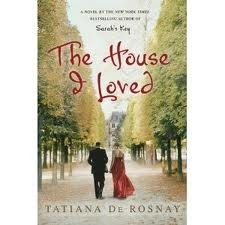
"For you, houses are like people, are they not, they have a soul, a heart, they live and breathe. Houses remember."
Tatiana De Rosnay, The House I Loved
The House I Loved, by Tatiana De Rosnay, was published in the US this month and is 222 pages. I've been a long time fan of De Rosnay. Her novels Sarah's Key and A Secret Kept are some of my favorites, and this book is no exception.
At heart, The House I Loved is a love letter to a dead husband and old Paris, before Napoleon and Baron Haussmann completed their massive modernization efforts of the city in the 1860s. Writing from the basement of her empty house on Rue Childebert, widow Rose Bazelet prepares for its demolition by refusing to leave and penning a long confession reflecting on her upbringing, marriage, children, friendships, and tragedies.
From the moment I began The House I Loved, I was mesmerized by De Rosnay's elegant, poetic style. I could almost hear Rose's voice whispering in my ear from her candle lit hiding place in her beautiful old home. I could feel the encroaching machines rumbling toward the Rue Childebert while Rose struggled to get her confessions on paper.
Throughout the novel, Rose's remembrances of relationships between lovers and friends are detailed in touching and surprising ways. An independent young florist, a persuasive book seller, a doting husband, a difficult daughter, a warm mother-in-law, and a selfless homeless wanderer are just a few of the characters so distinctly drawn they could walk off the page. Rose's aching honesty is at times touching and others brutal, but it is always heartfelt.
If you enjoy beautifully written historical fiction full of secrets and nostalgia, you will devour The House I Loved. Tatiana De Rosnay remains one of my favorite contemporary novelists.
February 20, 2012
Review: A Good American
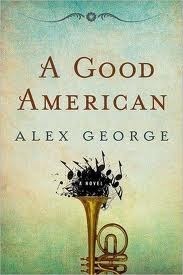
"At every opportunity he would bend low over the creased paper, murmuring the strange names of the towns beneath his fingers. He learned to recognize each state. He relished the chaotic topography of the eastern provinces, and saw hopeful poetry in the vast asymmetries to the west…"
(A GOOD AMERICAN, by Alex George)
A GOOD AMERICAN by Alex George was published last week and is 381 pages. I bought the book for four reasons: 1) Amy Einhorn Books published it, and I knew I couldn't go wrong there; 2) Alex is one of my Twitter pals; 3) I'm a sucker for epic, family-driven historical fiction; 4) How could I not love a book that begins: "Always, there was music." For all of these reasons, it is gratifying to say that I really, really loved this novel.
The book begins a century ago in Germany, where the large, opera-singing Frederick Meisenheimer falls in love with the robust, ungraceful Jette, and woos her with a song from over a garden hedge. Their enthusiastic walks and conversations lead to an enthusiastic enjoyment of one another, and the inevitable happens: Jette becomes pregnant.
Fleeing Jette's unforgiving mother and a village where they have no future, the two embark upon a journey that takes them to New Orleans, where they marry, and then meet a black cornet player named Lomax whose kindness saves them from ruin. He sends them upriver where Jette's labor forces them to settle in Beatrice, Missouri. The rest of the novel unfolds generation by generation, one unforgettable character at a time, over the sweeping backdrop of American history.
I can't remember the last time I read a story that covered a century so comprehensively, but that also helped me get to know characters so well that I laughed with them, cried with them, and gasped at the choices they made or witnessed. As a history lover, I could identify with the narrator, James, looking back over photographs and old marriage licenses, trying to make sense and meaning of the past. James' commentary made him and his flawed but colorful family very endearing.
From world wars, to Prohibition, to the assassination of President Kennedy, Alex George, gives world events emotional resonance and life through the unforgettable characters he creates. Reminiscent of FOREST GUMP for its connection to the past and for its profound emotional impact, I have no doubt that A GOOD AMERICAN will inspire readers everywhere. If you are a fan of epic family drama, you will love this novel.
A GOOD AMERICAN was recently named O Magazine's #1 "Title to Pick up Now", and is the #1 pick for Indie's Next List. If you want to learn more about Alex or his magnificent book, please visit his website at alexgeorgebooks.com.
January 27, 2012
Review: The Last Time I Saw Paris
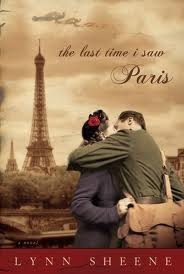
"Under Madame's tutelage in the little flower shop, Claire somehow became inspired–driven. The labor was a challenge, the product ephemeral. But this simple art had become her barricade against the growing darkness."
Lynn Sheene, The Last Time I Saw Paris
Lynn Sheene's debut novel, THE LAST TIME I SAW PARIS, was published in May of 2011 and is 354 pages. I heard about the novel on Twitter and when I saw that Ms. Sheene and I had the same agent, I figured I'd probably enjoy the book. I was not disappointed.
THE LAST TIME I SAW PARIS begins just before World War II in New York City, where socialite Claire Stone lives a life of wealth, glamour, and misery. As a former farm girl, she has scratched and clawed her way out of poverty, but has compromised her soul to do so. When her past comes back to haunt her, she must flee New York and her dangerous husband. She ends up in Paris in search of an old lover and a new start, and with the intent of resuming her quest for wealth at any cost.
As soon as Claire lands in Europe, she finds herself on a continent at the brink of war. The Paris of her dreams becomes a nightmare under Nazi occupation, and her old lover is not only married, but tied up to a group of French citizens involved in a resistance effort. As Claire tries to survive, she finds a job in an old flower shop with a generous, dignified Parisian, Madame Palain, whose recognition of Claire's talents inspires Claire to work hard and reassess her idea of happiness.
It isn't long before Claire becomes entangled in the dangerous network of resistance spies. She is tested in all areas of life and love, and while she makes mistakes along the way, her tremendous courage and loyalty saves lives.
WWII has so many hidden stories and Sheene has created an original and fascinating look at that time in history. Her prose is fearless and engaging, and her protagonist is complex. Claire's transformation is one of the most satisfying and complete that I've ever read, and I didn't want the book to end.
Fans of Jenna Blum's THOSE WHO SAVE US or Mararet Leroy's THE SOLDIER'S WIFE will love THE LAST TIME I SAW PARIS.
For more on Lynn Sheene or on the novel, visit her website at http://lynnsheene.com/ .








January 10, 2012
Review: The Crown
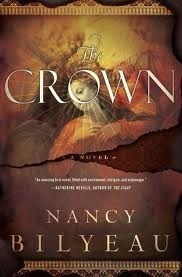
"An aristocratic young nun must find a legendary crown in order to save her father–and preserve the Catholic faith from Cromwell's ruthless terror. The year is 1537…"
Nancy Bilyeau, THE CROWN
THE CROWN, by Nancy Bilyeau, is 402 pages. Last month, I received an advanced reader copy for review from the publisher, Touchstone/Simon & Schuster, and I'm thrilled to finally share my excitement over it.
When THE CROWN begins, young Dominican novice, Joanna Stafford, has just broken the strict rule of enclosure of her priory to attend the public burning of her beloved cousin, Lady Margaret, for treason against King Henry VIII. Determined to provide comfort and prayer to her cousin, even if just from afar, Joanna embarks on a journey that she is ill-prepared for in all aspects.
The unexpected intervention of Joanna's father leads to their arrest, and they are sent to the Tower of London to await their fate. When the scheming Bishop of Winchester hears of Joanna's imprisonment and station at Dartford Priory, she suddenly becomes of use to him. He threatens to torture her father to death unless she helps him find the ancient crown of Athelstan that he tells her will change the political landscape of the country and save the monasteries from Cromwell's destruction.
Upon Joanna's return to Dartford, she becomes a pawn in a game played by powerful, greedy men. When secrets, schemes, and murder taint the priory, Joanna is forced to confront her beliefs and make difficult choices in order to save her father and her way of life.
THE CROWN is every bit as exciting and suspenseful as the jacket copy and descriptions promised. Bilyeau kept me turning pages and second guessing my predictions late into the three nights it took me to devour it. Joanna is an incredibly endearing character. Her internal struggles to maintain obedience while satisfying her curiosity and doing what she thinks is right make for excellent tension and story development. The supporting cast of monks, novices, detectives, and politicians is every bit as fascinating as Joanna, and their personal stories and contributions to the plot provide many layers of intrigue. In addition to the masterfully drawn plot and interesting characters, the prose is compulsively readable and stylish, and will satisfy the spectrum of readers who love history, suspense, and literature.
If you enjoy books by Philippa Gregory and Ken Follett, I highly recommend THE CROWN. It is an outstanding debut by a talented writer, and I was thrilled to find out that Ms. Bilyeau is working on a sequel to the novel.
For more on the author, visit her website at http://www.nancybilyeau.com/index.html








January 1, 2012
2011 in review
The WordPress.com stats helper monkeys prepared a 2011 annual report for this blog.
Here's an excerpt:
The concert hall at the Syndey Opera House holds 2,700 people. This blog was viewed about 13,000 times in 2011. If it were a concert at Sydney Opera House, it would take about 5 sold-out performances for that many people to see it.
Click here to see the complete report.








December 28, 2011
The Right Time to Write
I'm a writing stager.
Picture my Perfect Writing Environment (PWE): Sloppy Joe's coffee mug on the right. Hemingway photo book and pencil set on the left. Zelda Fitzgerald books and gallery pamphlet on the right. Two Penguin erasers straight ahead. Various notes and research books scattered about. Bailey the dog curled up in my reading chair. My little one napping. Chopin piano mix playing on Pandora.
But notice that I said my "perfect" writing environment. More often than not, the photo books are missing because I was flipping through them while making lunch and forgot to put them back. The little guy who is supposed to be napping has stolen the Penguin erasers and is playing with them. The dog is barking at deer in the front yard.
When the perfect writing alchemy isn't achieved, I can often be found clicking through photos on Facebook, catching up on Twitter, or wandering through the house, performing chores, grumbling to the Muse in my head about a dearth of coffee or a surplus of noise.
So imagine my surprise last week, when I found myself sitting at my oldest son's hockey practice (well, that's not a surprise, we're at the rink five days a week) with my two younger sons occupied with other younger siblings, team parents in conversations with each other or their cell phones, and me, alone, staring at my middle son's drawing pad and pencil. A scene idea started tugging on my sleeve, so I thought I'd jot down some notes that I could use later in the PWE.
In what seemed like moments later, my youngest son was tugging on my sleeve, telling me that the team was off the ice. I looked at the paper and realized I'd written a lengthy scene–several pages, front and back–of a pivotal moment in the book, right there on my child's drawing pad.
I think you can see where I'm going.
I learned a valuable lesson that day: whether I'm in my PWE or an ice-cold, smelly hockey rink surrounded by noise and people, sometimes the right time to write is right now.
Right here and now.
I need that reminder every now and then, so I thought I'd remind you writers, too.
So go. Now. Write.








December 26, 2011
Vote for a Title
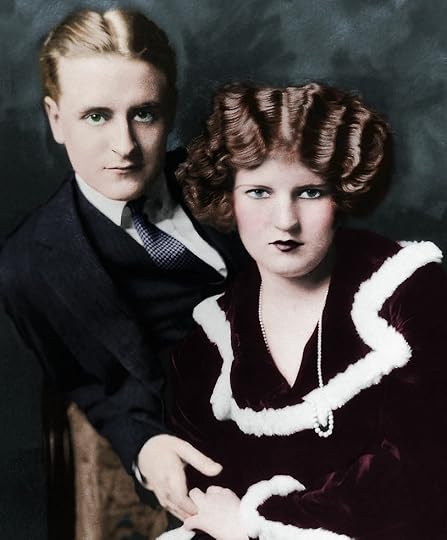
I need your help.
I need a working title for my WIP ("work in progress" AKA my new novel.)
Many writers wait until the end of the process to pick a title, but I'm very unsettled by not having a name for my baby, even if it could be changed at a later date. My original working title, THE CONFESSIONS OF MRS. F. SCOTT FITZGERALD, can't be used because apparently there was a book released by my publisher with a similar "Confessions of…" title.
I can't reveal much about my novel, but I can tell you that Scott and Zelda Fitzgerald are characters. I am going to list the titles I currently have in the running and, if you are so inclined, please a) react with your gut when you read the titles, and then b) read my thoughts and tell me if you still feel that way. The most important reaction, however, is your gut because it's what would lead you as a buyer to be intrigued by a book. And while literary merit is of paramount importance to me, my publisher would not be pleased if I ignored cold hard reality (AKA sales appeal.)
Without further ado:
1. ZELDA'S DIARIES
2. ZELDA, RENDERED
3. THE RENDERING OF MRS. F. SCOTT. FITZGERALD
* * *
My thoughts on each:
1. ZELDA'S DIARIES seems to have commercial appeal and has a similar sound to the title of my forthcoming novel, HEMINGWAY'S GIRL.
2. The word render loosely means to create something artistically and also, to burn. Both definitions apply literally and figuratively in the novel.
3. Again, render is important. Also, Zelda resented being thought of only as "Mrs. F. Scott Fitzgerald" instead of as an individual, so this title has layered meanings.
* * *
Okay, so now what do you think?
I would be very grateful if you would give me your thoughts, or if you have other suggestions, feel free to list those.
Thank you, in advance.
*Photo courtesy of xihearthe80sx at DeviantArt.com

